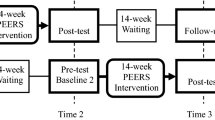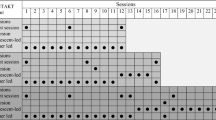Abstract
Previous studies on social skills training on ASD were done almost exclusively in the West with children as the main subjects. Demonstrations of the applicability of social interventions in different cultures and age groups are warranted. The current study outlined the development and preliminary evaluation of a CBT-context-based social competence training for ASD (CBT-CSCA) developed in Hong Kong for Chinese adolescents with ASD. Twenty-five adolescents (aged 12–17 years, with a FSIQ above 80) were recruited. Significant improvements in social competence, autistic symptoms and general psychopathology at post-training and 3-month follow-up were reported by the parents. The study provided initial evidence support to the applicability of social competence training for adolescents with ASD in a different culture.


Similar content being viewed by others
References
Abbeduto, L., Seltzer, M., Shattuck, P., Krauss, M., Orsmond, G., & Murphy, M. (2004). Psychological well-being and coping in mothers of youths with autism, down syndrome, or fragile X syndrome. American Journal on Mental Retardation, 109(3), 237–254.
Allison, C., Auyeung, B., & Baron-Cohen, S. (2012). Toward brief “red flags” for autism screening: The short autism spectrum quotient and the short quantitative checklist in 1000 cases and 3000 controls. Journal of the American Academy of Child & Adolescent Psychiatry, 51(2), 202–212.
American Psychiatric Association. (2013). Diagnostic and statistical manual of mental disorders (5th edn.). Washington, DC: American Psychiatric Association
American Psychiatric Association Task Force on Evidence-Based Practice. (2006) Evidence-based practice in psychology. American Psychologist, 61, 271–285.
Barker, E., Hartley, S., Seltzer, M., Floyd, F., Greenberg, J., & Orsmond, G. (2011). Trajectories of emotional well-being in mothers of adolescents and adults with autism. Developmental Psychology, 47(2), 551–561.
Baron-Cohen, S. (1989). The autistic child’s theory of mind: A case of specific developmental delay. Journal of Child Psychology and Psychiatry, 30(2), 285–297.
Baron-Cohen, S., Wheelwright, S., Skinner, R., Martin, J., & Clubley, E. (2001). The autism-spectrum quotient (AQ): Evidence from Asperger syndrome/high-functioning autism, males and females, scientists and mathematicians. Journal of Autism and Developmental Disorders, 31(1), 5–17.
Bernal, G., Jiménez-Chafey, M. I., & Domenech Rodríguez, M. M. (2009). Cultural adaptation of treatments: A resource for considering culture in evidence-based practice. Professional Psychology: Research and Practice, 40(4), 361–368.
Berry, J. O., & Jones, W. H. (1995). The parental stress scale: Initial psychometric evidence. Journal of Social and Personal Relationships, 12(3), 463–472.
Bierman, K., & Welsh, J. (2000). Assessing social dysfunction: The contributions of laboratory and performance-based measures. Journal of Clinical Child Psychology, 29(4), 526–539.
Chan, R. S. W., Lo, T. Y., & Tang, C. P. (2014). Social competence as the centrality of intervention for autism spectrum disorder (ASD): why and how? Hong Kong Journal of Mental Health, 40(1), 5–11.
Cheung, S. (2000). Psychometric properties of the Chinese version of the parental stress scale. Psychologia: An International Journal of Psychology in the Orient, 43, 253.
Cohen, J. (1988). Statistical power analysis for the behavioral sciences (2nd edn.). Hillsdale, NJ: Erlbaum.
Daley, T. (2002). The need for cross-cultural research on the pervasive developmental disorders. Transcultural Psychiatry, 39(4), 531–550.
Domenech Rodríguez, M., & Weiling, E. (2004). Developing culturally appropriate, evidence-based treatments for interventions with ethnic minority populations. In M. Rastogin & E. Weiling (Eds.), Voices of color: First person accounts of ethnic minority therapists (pp. 313–333). Thousand Oaks, CA: Sage.
Gresham, F., Sugai, G., & Horner, R. (2001). Interpreting outcomes of social skills training for students with high incidence disabilities. Exceptional Children, 67(3), 331–345. 6(3 .
Hanley, G., Iwata, B., & Thompson, R. (2001). Reinforcement schedule thinning following treatment with functional communication training. Journal of Applied Behavior Analysis, 34, 17–38.
Klin, A., Saulnier, C., Sparrow, S., Cicchetti, D., Volkmar, F., & Lord, C. (2007). Social and communication abilities and disabilities in higher functioning individuals with autism spectrum disorders: The Vineland and the ADOS. Journal of Autism and Developmental Disorders, 37(4), 748–759.
Laugeson, E., Frankel, F., Gantman, A., Gantman, A., Dillon, A., & Mogil, C. (2012). Journal of Autism and Developmental Disorders, 42(6), 1025–1036.
Leung, C. (2015). The Construction and Validation of Short-Form, Chinese Autism Spectrum Quotient (Chinese-AQ-10) (Unpublished Master Dissertation). Department of Psychology, The Chinese University of Hong Kong, Hong Kong.
Leung, P. W., Kwong, S. L., Tang, C. P., Ho, T. P., Hung, S. F., Lee, C. C., … Liu, W. S. (2006). Test–retest reliability and criterion validity of the Chinese version of CBCL, TRF, and YSR. Journal of Child Psychology and Psychiatry, 47(9), 970–973.
Leung, T. Y. (2014). A psychometric study of the Chinese version of the multidimensional social competence scale (MSCS-C) on adolescents with autism spectrum disorder (ASD) in Hong Kong (Unpublished Master Dissertation). Department of Psychology, The Chinese University of Hong Kong, Hong Kong.
Lopata, C., Thomeer, M. L., Volker, M. A., Nida, R. E., & Lee, G. K. (2008). Effectiveness of a manualized summer social treatment program for high-functioning children with autism spectrum disorders. Journal of Autism and Developmental Disorders, 38(5), 890–904.
Lovaas, O. (1987). Behavioral treatment and normal educational and intellectual functioning in young autistic children. Journal of Consulting and Clinical Psychology, 55, 3–9.
Miller, A., Vernon, T., Wu, V., & Russo, K. (2014). Social skill group interventions for adolescents with autism spectrum disorders: A systematic review. Review Journal of Autism and Developmental Disorders, 4, 254–265.
Miller, M., & Ingham, J. (1976). Friends, confidants and symptoms. Social Psychiatry, 11(2), 51–58.
Ozonoff, S., & Miller, J. (1995). Teaching theory of mind: A new approach to social skills training for individuals with autism. Journal of Autism and Developmental Disorders, 25(4), 415–433.
Ravindran, N., & Myers, B. (2012). Cultural influences on perceptions of health, illness, and disability: A review and focus on autism. Journal of Child and Family Studies, 21(2), 311–319.
Reichow, B., Steiner, M. A., & Volkmar, F. (2013). Cochrane review: social skills groups for people aged 6 to 21 with autism spectrum disorders (ASD). Evidence-Based Child Health: A Cochrane Review Journal, 8(2), 266–315.
Reichow, B., & Volkmar, R. (2010). Social skills interventions for individuals with autism: evaluation for evidence-based practices within a best evidence synthesis framework. Journal of Autism and Developmental Disorders, 40(2), 149–166.
Rieffe, C., Camodeca, M., Pouw, L. B., Lange, A. M., & Stockmann, L. (2010). Don’t anger me! Bullying, victimization, and emotion dysregulation in young adolescents with ASD. European Journal of Developmental Psychology, 9(3), 351–370.
Schall, M., & McDonough, J. (2010). Autism spectrum disorders in adolescence and early adulthood: Characteristics and issues. Journal of Vocational Rehabilitation, 32(2), 81–88.
Shattuck, T., Orsmond, G., Wagner, M., & Cooper, B. (2011). Participation in social activities among adolescents with an autism spectrum disorder. PloS ONE, 6(11), e27176.
Simonoff, E., Pickles, A., Charman, T., Chandler, S., Loucas, T., & Baird, G. (2008). Psychiatric disorders in children with autism spectrum disorders: prevalence, co-morbidity, and associated factors in a population-derived sample. Journal of the American Academy of Child & Adolescent Psychiatry, 47(8), 921–929.
Wang, J., Hu, Y., Wang, Y., Oin, X., Xia, W., Sun, C., ... Wang, J. (2013). Parenting stress in Chinese mothers of children with autism spectrum disorders. Social Psychiatry and Psychiatric Epidemiology, 48(4), 575–582.
White, S. W., Ollendick, T., Albano, A. M., Johnson, C., Oswald, D., Johnson, C., ... Scahill, L. (2013). Randomized controlled trial: Multimodal anxiety and social skill intervention for adolescents with autism spectrum disorder. Journal of Autism and Developmental Disorders, 43(2), 382–394.
Wong, P. (2010). The Chinese Autism Spectrum Quotient - Adolescent Version (Unpublished Doctoral Dissertation). Department of Psychology, The Chinese University of Hong Kong, Hong Kong.
World Health Organization. (1992). The ICD-10 classification of mental and behavioural disorders: Clinical descriptions and diagnostic guidelines. Geneva.
Yager, J., & Iarocci, G. (2013). The development of the multidimensional social competence scale: a standardized measure of social competence in autism spectrum disorders. Autism Research, 6(6), 631–641.
Yoo, H. J., Bahn, G., Cho, I. H., Kim, E. K., Kim, J. H., Min, J. W., … Cho, S. (2014). A randomized controlled trial of the Korean version of the PEERS® parent-assisted social skills training program for teens with ASD. Autism Research, 7(1), 145–161.
Zahavi, D. (2010). Complexities of self. Autism: The International Journal of Research and Practice, 5, 547–551.
Acknowledgments
The authors would like to acknowledge the Hong Kong Jockey Club Charities Trust for its financial support to the Jockey Club iREACH Social Competence Development Center, New Life Psychiatric Rehabilitation Association. We would also like to thank Fan Mui Ying, Joe Chan, Wendy Tam, Jade Wong, Rita So, Bonnie Poon, Derek Li, Ming Tam, Lau Chi Ming and Keith Wong for their valuable assistance in this study. We are grateful to the adolescents and families who participated.
Author Contributions
RC and SY developed the study. CL wrote the first draft of the manuscript under the supervision of RC & SY. DN performed the statistical analysis and wrote the results part. RC revised and finalized the manuscript.
Author information
Authors and Affiliations
Corresponding author
Ethics declarations
Conflict of interest
The authors have no conflicts of interest.
Rights and permissions
About this article
Cite this article
Chan, R.W.S., Leung, C.N.W., Ng, D.C.Y. et al. Validating a Culturally-sensitive Social Competence Training Programme for Adolescents with ASD in a Chinese Context: An Initial Investigation. J Autism Dev Disord 48, 450–460 (2018). https://doi.org/10.1007/s10803-017-3335-6
Published:
Issue Date:
DOI: https://doi.org/10.1007/s10803-017-3335-6




